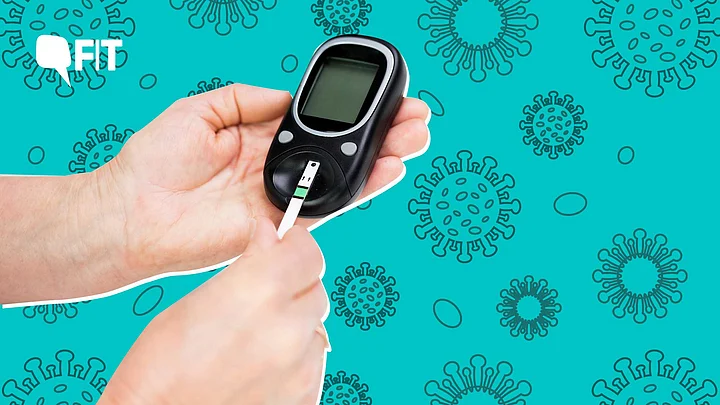While the COVID-19 pandemic has altered our days and lives in unexpected ways, for some among us, the threat from the illness could be bigger and more severe. Older adults and people of any age who have serious underlying medical conditions may be at higher risk for more serious complications from COVID-19.
According to the World Health Organisation,
Data from China has revealed that while the death rate from the disease among people without comorbid conditions was 1.4 percent, it was over 9 percent among diabetics.
Another study published in The Lancet found that among 32 non-survivors from a group of 52 intensive care unit patients with COVID-19, 22 percent were diabetics, making diabetes one of the most ‘distinctive comorbidities’.
What’s behind these numbers and what do diabetics have to do to stay safe? FIT speaks with experts to understand.
Diabetes and Infections
Diabetes is a chronic metabolic disease in which a person has high blood glucose (blood sugar) level either due to inadequate insulin production or because the body's cells do not respond properly to insulin or both.
In conversation with FIT, Dr Anoop Misra, Chairman, National Diabetes, Obesity and Cholesterol Foundation (N-DOC), says,
In a study co-authored by him, it was noted that individuals with diabetes are, in general, at higher risk of infections such as influenza and pneumonia.
A similar trend was observed during previous outbreaks, especially when diseases were caused by respiratory viruses.
While data on COVID-19 among diabetics is still relatively limited, past experiences and numbers from China suggest diabetics could in fact be at a higher risk in the current pandemic.
What explains the link?
According to WebMD, diabetes can slow down your body's ability to fight infection. The high sugar levels in your blood and tissues allow bacteria to grow and help infections develop more quickly. Dr Anoop explains that sugar imbalance can weaken the defence systems in people with diabetes.
By causing greater stress on the body’s system, the virus could infect and affect other organs as well, leading to further complications.
India is deemed the diabetes capital of the world. According to its National Health Portal, India has over 60 million diabetics out of a population of 1.3 billion. The number is expected to increase to a staggering 109 million cases by 2035 out of an estimated population of 1.5 billion.
In fact, all the cases who have died so far in India of COVID-19 disease, have had underlying conditions - from hypertension and diabetes, to kidney disease and asthma.
With novel coronavirus cases on a steady rise in the country, awareness among individuals with diabetes about the risk it could pose to them is especially important. What can they do to minimise this risk?
“Nothing Is Better Than a Well-Controlled Diabetic”
This is what Harsh Kohli, a type 1 diabetic himself, and co-founder of Diabetes India Youth Action (DIYA) tells FIT when asked about how he is taking care of himself during the pandemic.
Following common safety precautions such as maintaining hand and respiratory hygiene and social distancing thus, comes foremost for people with diabetes (like for everybody). Beyond that, Dr Anoop Misra recommends diabetics to check their blood sugar more frequently than usual in order to make note of any fluctuations. If sugar is not controlled, they should immediately consult a doctor. It is also important to take influenza and pneumonia vaccination, and take time out to exercise and follow a healthy diet.
The aforementioned study, published online in ScienceDirect, states, “Hospitalised patients with severe disease (COVID-19) need frequent blood glucose monitoring. Oral agents especially metformin and sodium glucose cotransporter-2 inhibitors need to be stopped. Insulin is the preferred agent for control of hyperglycemia in hospitalised sick patients.”
For regular check-ups and questions, he says, people could talk to their physicians on the phone or opt for e-consultations, to avoid traveling to the place unless necessary. In fact, he has opened a helpline (08826570322) for patients to entertain queries on diabetes management during the coronavirus pandemic.
Preparedness: Insulin Stocking?
But another question that arises is, should people with diabetes be stocking up on insulin?
In times of lockdown and curfews, Dr Anoop recommends keeping a stock of insulin to last for a month at least, although medical shops are expected to remain open and there shouldn’t be a reason to worry.
Harsh Kohli says, “We are aware that the country has enough stock. But we have some extra supplies. If I normally keep insulin stock for a month, I’ve extended that to cover for 45 days now, and the same goes other requirements like pens, syringes and other kits.”
Another point he makes is the need for each and every one of us to be aware of any diabetics or people with any chronic illnesses living around us, who may need us any time. This is a time for solidarity and being there for those in need, he says.
In the end, the rule for diabetics is simple. “If your blood sugar levels are in range, then you are as good as a normal functioning person. But recognize the risk and take precautions. Self-isolate, we are all doing it,” Harsh adds.
(At The Quint, we question everything. Play an active role in shaping our journalism by becoming a member today.)
